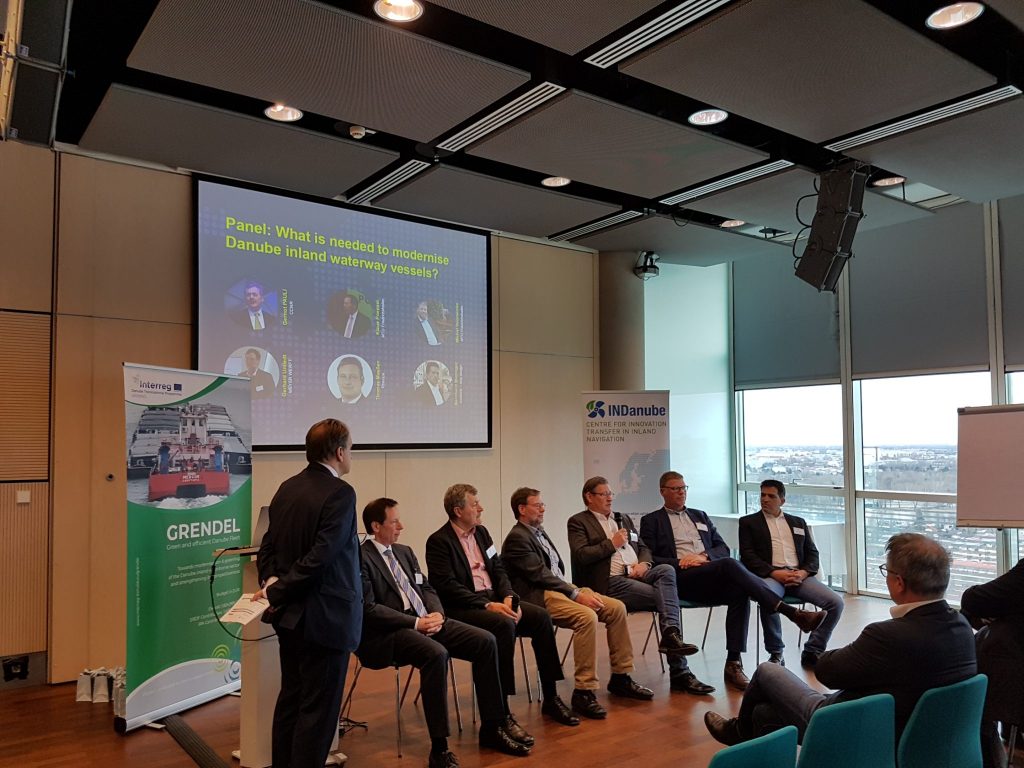Know-how transfer on modernisation of Danube fleet
Published: March 13, 2019
Vienna. 7-8 March 2019. Inland shipping is facing enormous challenges with regard to the further optimisation of energy efficiency, environmental and climate protection. To address the greening and modernisation challenges of inland vessels operators from the Danube region, almost 80 experts from whole Europe met in Vienna on 7-8 March 2019.
 INDanube together with the project GRENDEL (Green and Efficient Danube Fleet) prepared already the second edition of the know-how transfer event dealing with the modernisation of the Danube fleet (first one held in April 2018). Manifold of themes were discussed, among others the impact and challenges of Non-Road Mobile Machinery Directive (EU) 2018/1628 for vessel operators, as well as the technological answers to the Stage V emission limits in terms on the use of alternative fuels, after-treatment or new propulsion systems. The main focus of the first day was on setting the framework and showing deployment activities as well as emerging future solutions that are currently investigated as part of the research and innovation projects. On the second day, the technology suppliers presented their solutions.
INDanube together with the project GRENDEL (Green and Efficient Danube Fleet) prepared already the second edition of the know-how transfer event dealing with the modernisation of the Danube fleet (first one held in April 2018). Manifold of themes were discussed, among others the impact and challenges of Non-Road Mobile Machinery Directive (EU) 2018/1628 for vessel operators, as well as the technological answers to the Stage V emission limits in terms on the use of alternative fuels, after-treatment or new propulsion systems. The main focus of the first day was on setting the framework and showing deployment activities as well as emerging future solutions that are currently investigated as part of the research and innovation projects. On the second day, the technology suppliers presented their solutions.
Transferring knowledge to vessel operators is a vital prerequisite for decisions directly linked to financing the modernisation of a fleet that urgently needs comprehensive investments in order to be able to compete with other modes of transport. During the event it was concluded that the governments of the Danube region should proactively support the greening of the fleet. By looking at the current regulatory framework, it became clear that concrete incentives are, with rather few exceptions, missing.
In the GRENDEL project, based on the knowledge gained at similar know-how exchange events, the vessel operators will prepare and fine-tune their investments plans (technologies and financial volumes). The technological requirements as well as the financial volumes coming from the sector will be consolidated and fed to the content of the State Aid scheme model which will be one of the outcomes of the GRENDEL project. It is expected that the Danube countries, which all actively cooperate with the GRENDEL consortium, will implement – based on this model – their own national State Aid schemes in the upcoming budgetary period 2021-2027. An example of the French State Aid scheme, presented in Vienna, shows that this is one way how governments and regions can support the vessel operators to become green and competitive.
The outcomes of the event are summarised in the attached document.
DOWNLOAD SECTION
Factsheets to download:
- Factsheet: Why to modernise inland vessels. Edition January 2019 (English)
- Factsheet #1: Gas and Gas-electric propulsion. Edition January 2019 (English)
- Factsheet #2: Diesel electric propulsion. Edition January 2019 (English)
- Factsheet #3: After-treatment. Edition February 2019 (English)
Presentations for download:
- Setting up scene, purpose and objectives of the know-how transfer event (Manfred Seitz, PDI)
- Activities in the framework of CCNR (Gernot Pauli, CCNR)
- Insights into the GRENDEL project, a unique project in the Danube region addressing environ-mental & economic performance of Danube fleet (Charlotte Siot, PDI)
- Insights into the state aid scheme in France and inland vessels modernisation initiatives triggered & facilitated through public support (Eloi Flipo, VNF)
- New technology in pilot deployment through Interreg and insights into to diesel-electric, cabin vessels, solar powered, etc. (Kai Buchloh, Schiffstechnik Buchloh GmbH u. Co. KG)
- NRMM: Challenges, solutions & outlook for different technologies (Khalid Tachi, EICB)
- GRENDEL Innovation Factsheets & collection of technological requirements of Danube fleet feeding to State Aid schemes (Benjamin Friedhoff, DST)
- Cold-ironing as sustainable & eco-friendly shore-side power supply – effects on pollution, fuel consumption & emissions (Christoph Kreuzinger, Würzburger Hafen, Germany)
- The first steps of our journey towards autonomous vessels (Stephan Stout, DAMEN, Netherlands)
- Ambient Water Transmissions (Dominik Cofalka, Reintrieb, Austria)
- On the way to zero emission shipping: hydrogen in combustion engines (Igor Sauperl, Large Engines Competence Center, Austria)
- CLean INland SHipping „CLINSH“ (Frank Appelman, Province Zuid-Holland)
- Waterbus in Slovakia: Regular service line on Danube river (Gabriel Meszaros, PRODANUBIA)
- Electric propulsion: Integrated solutions for inland vessels (Stephan Krahn, Baumüller Anlagen-Systemtechnik)
- Mobile gas engine for marine applications – S4000 (Arnd Lielhammer, MTU Friedrichshafen GmbH)
- Options and trends in propulsion of future river cruise vessels (Gerhard Untiedt, MEYER WERFT GmbH & Co. KG)
- After-treatment solutions (SCR/DPF) for Diesel engines (Florian Franken, TEHAG Deutschland)
- Cleaner Future by new diesel fuels? (Sebastian Dörr, Neste / Lubtrading GmbH)
- How Rhenus answers the modernisation needs of its fleet (Thomas Maaßen, Rhenus SE & Co. KG)